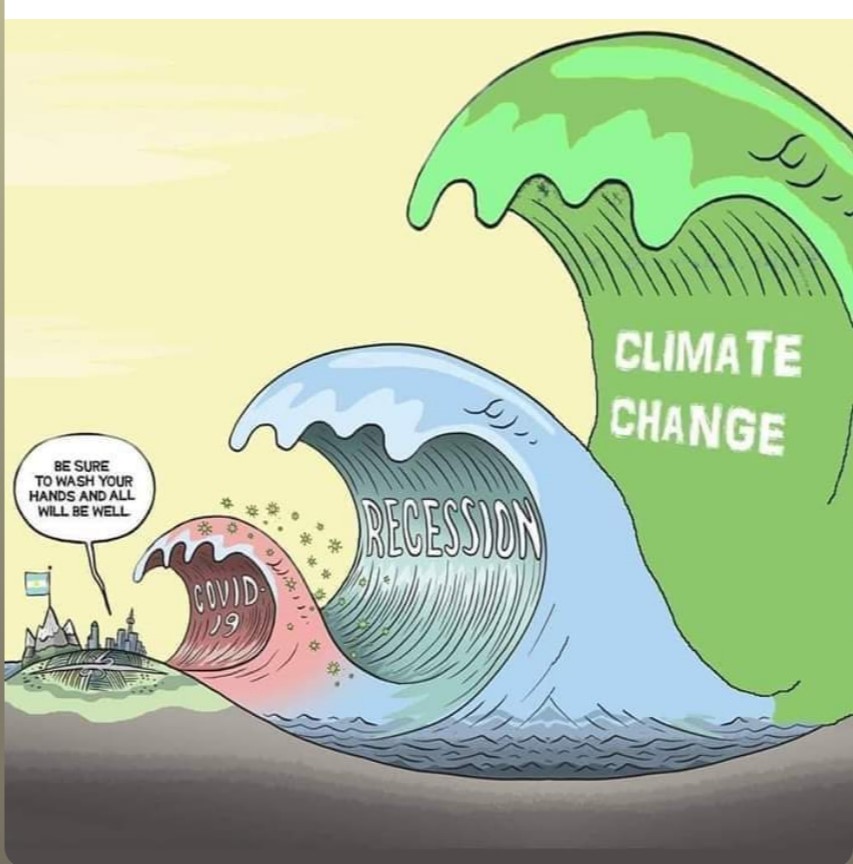An honest reckoning is long overdue.
By DAVID KYLER, Center for a Sustainable Coast
“The point is, ladies and gentlemen, that greed, for lack of a better word, is good. Greed is right, greed works. Greed clarifies, cuts through, and captures the essence of the evolutionary spirit. Greed, in all of its forms — greed for life, for money, for love, knowledge — has marked the upward surge of mankind.” From the 1987 film, Wall Street.
In the 35 years since the fictional character Gordon Gekko proclaimed that greed is good in the movie “Wall Street,” the tycoon’s assertion, further empowered by the 2010 Supreme Court Citizens United decision, has taken a treacherous toll on America and, in various ways, the world beyond. Thanks to prolonged supremacy of the greed ethic over the past four decades, stockholder affluence has soared while the U.S. minimum wage, inflation adjusted, is less than a third of what it was in the 1970s. Concurrently, along with such financial injustices that eroded the working wage and depleted the middle class, environmental negligence has escalated, with severe consequences.
A recent, controversial example is the preventable railroad accident in eastern Ohio, spilling hazardous materials that killed wildlife and will likely cause diverse public health risks for years to come.
According to news coverage, the cost of installing braking devices – that could have stopped hundreds of thousands of gallons of toxic chemicals from contaminating the city of East Palestine and its inhabitants – was deemed unjustified by Norfolk Southern Railway executives. Equally troubling, the railway industry used its political clout to get the federal government to weaken rules so that trains with fewer than 70 cars carrying hazardous material are not required to have electronically controlled pneumatic brakes. Furthermore, they reduced crew size and inspection standards that boosted rail industry profits by taking risky shortcuts.
The biased calculations used in these selfish trade-offs, made to exclusively serve narrow corporate goals, are ubiquitous and increasingly driven by the outsized influence of well-paid professional lobbyists, who too often produce grossly unethical hidden consequences. Corporate profits are boosted by a combination of degraded safety precautions and inadequate accountability when the public, and/or workers, are injured – unfairly shifting private costs and suffering onto unwary third parties.
Similar regressive outcomes have occurred through relaxed environmental enforcement. In June 2022, the US Supreme Court ruled that EPA cannot limit state-level carbon emissions under the 1970 Clean Air Act. This constraining rollback, serving short-term motives of the power industry at the public’s expense, is brazen circumvention of urgently needed policy goals adopted by Congress. Moreover, the ruling defied well-established scientific findings that such emissions are the main cause of climate change, an unparalleled threat to human health and vital life-support systems. In recent decades other threats to the public accumulated in an array of lower-court decisions failing to penalize violations of state and federal regulations, weakening natural-resource safeguards and environmental justice. And in May 2023 the Supreme Court delivered a decision degrading federal Clean Water Act protections over millions of acres of wetlands that are essential to water quality, wildlife habitat, flood prevention, and human health.
By prioritizing short-term property income and investment interests over the common good, bolstered by government funding favoring intertwined fossil-fuel and financial institutions, the injustices of U.S. policies are only outdone by certain states, including Georgia, that reward industry investors at the citizens’ expense, even for mismanaged projects.
As the earth hurdles toward ever-worsening climate hazards and economic injustice, we can no longer tolerate the indiscriminate promotion of all development under “greed-is-good” policy, as if it inherently benefits society. Until more objective and holistic assessment standards are applied in using public resources and regulatory authority to guide business activities, government programs will continue generating inequitable and environmentally harmful outcomes.
For example, while Georgia wins unbridled praise for securing major investments in the manufacture of batteries, solar panels, and electric vehicles, officials remain stubbornly regressive in the state’s energy policy by severely restraining the implementation of rooftop solar infrastructure. Energy experts advise that the widespread use of rooftop solar and on-site battery storage will not only reduce consumer energy costs, but it will help ensure a more stable and resilient power grid as demand grows and extreme weather threats worsen.
Concurrently, Georgia’s energy policymakers have expanded the use of natural gas, a fossil fuel that emits heat-trapping gases when burned and is linked to an array of methane leaks that dangerously compound global overheating. Furthermore, unlike most states, Georgia has failed to adopt a clean-energy transition plan or scheduled targets for reducing carbon emissions.
Likewise, Georgia officials have imposed grossly excessive cost overruns, incurred in Georgia Power’s Vogtle nuclear plant expansion, on residential customers, who have suffered a rate increase near 30 percent since 2010, while industrial rates grew by only 0.3 percent. These Vogtle costs are some $20 billion over budget, and still increasing by millions weekly. In effect, residential energy customers are subsidizing Georgia’s industrial development – and Georgia Power’s profit margin – without public approval, and probably without the understanding of those who are most financially abused because of it.
Meanwhile, economic development proponents have received unqualified support for producing clean-energy equipment, while Georgia markets for it are either stymied by state policies (solar panels) or encumbered by products (electric vehicles) that will be recharged primarily with power produced by burning fossil fuels.
To initiate remedies for these blatant contradictions and inequities, rigorous standards must be adopted and consistently applied, including the following recommended criteria:
- Public costs for subsidizing economic development projects, including tax exemptions, low-cost leases, and below-market land/energy, must not be imposed on taxpayers and energy customers without their formal agreement through detailed, specific voter referendums.
- Government support for ‘job creation’ in the clean-energy sector must require both enhanced working conditions and employee benefits as well as energy policies that are consistent with the goal of reducing heat-trapping gases that cause disruptive climate damages. States like Georgia, without such policies, should not be eligible for federal support, including grants and/or tax credits provided through the Infrastructure Act and the Inflation Reduction Act.
- Any state receiving clean-energy development incentives must be required to adopt a transition plan and routinely report corresponding implementation efforts. States without such plans or sufficient progress in implementing them, must not be eligible for receiving federal support.
- The environmental impacts of clean-energy projects must be thoroughly analyzed, publicly reviewed, and reliably evaluated, consistent with applicable state and federal laws. The potential benefits of clean-energy projects do not justify regulatory exemptions or lax enforcement. Impacts of these projects on water, air quality, surrounding land uses, and other factors must be responsibly assessed and all reasonable alternatives must be rigorously but expediently evaluated.
Unless we can rapidly surmount powerful political interests fixated on short-term profitmaking, humanity's prospects will grow increasingly dire as our life-support systems further degenerate. The common good, essential to our future, can only be realized by responsibly controlling greed.



